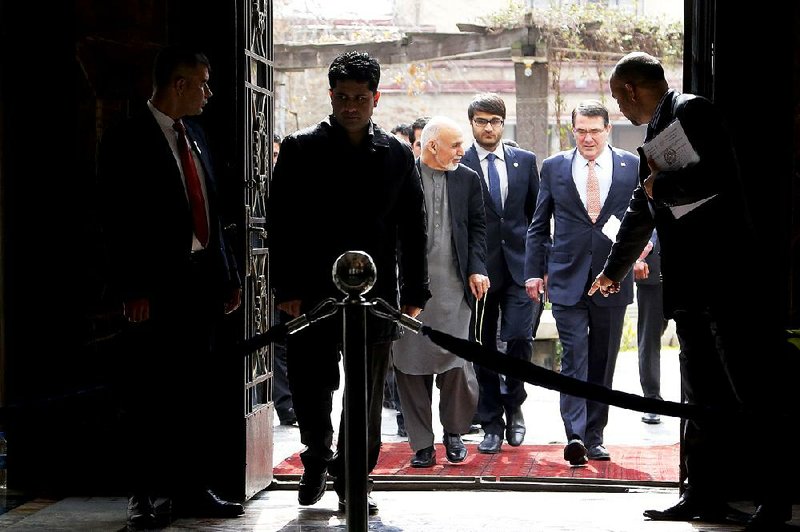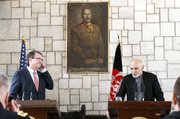KABUL, Afghanistan -- Four days into his tenure as defense secretary, Ashton Carter arrived in Afghanistan on Saturday morning and opened up the possibility of slowing the withdrawal of the last American troops in the country to help keep the Taliban at bay.
The 10,000 troops are now conducting counterterrorism operations and advising the Afghan military, and most are scheduled to be withdrawn by the end of 2016.
Carter said President Barack Obama's administration was open to having a stronger military relationship with the current Afghan unity government, led by President Ashraf Ghani. Ghani's government has reset relations with the West after turbulent years when President Hamid Karzai often clashed with the United States.
"A lot has changed here, so much for the better," Carter said. "Our priority now is to make sure this progress sticks. That is why President Obama is considering a number of options to reinforce our support for President Ghani's security strategy, including possible changes to our timeline for the withdrawal of U.S. troops."
He also said the United States was "rethinking the details" of its counterterrorism operation in Afghanistan, but he did not elaborate.
Afghan and American officials have said the U.S. forces were already playing direct combat roles in many joint special-operations raids and were not simply going along as advisers. That is at odds with policy declarations by the administration, which has deemed the U.S. role in the war essentially over, but reflects the reality in Afghanistan, where record numbers of Afghan soldiers, police and civilians died in fierce fighting last year.
The Afghan and American leaders are expected to have more discussions about troop levels when Ghani visits Obama next month at the White House.
The presidents also plan to talk about the future of the counterterrorism fight in Afghanistan, Carter said.
In Afghanistan, there are remnants of al-Qaida as well as signs that the Islamic State militant group is seeking to make inroads.
Campbell said he is monitoring Islamic State recruiting efforts in Afghanistan, noting that the militant group showed in Iraq that it can, under the right circumstances, spread its influence quickly.
Carter did not say Obama was considering keeping U.S. troops in Afghanistan beyond 2016 -- only that the president was rethinking the pace of troop withdrawals for 2015 and 2016.
The number of U.S. troops in Afghanistan is down from a peak of 100,000 as recently as 2010-11.
The U.S. already has spent $65 billion building Afghanistan's army and police forces, and billions more are projected over the next decade. The U.S. and its allies are paying 65 percent of Afghanistan's budget this year.
On Feb. 11, the White House said Ghani had requested "some flexibility in the troop drawdown timeline" and that the administration was "actively considering" it. A day later, Gen. John Campbell, the top U.S. commander in Afghanistan, told the U.S. Senate Armed Services Committee that he had presented U.S. leaders with several options that would allow him to better continue training and advising Afghan forces, particularly through this summer's peak fighting season.
Obama's current plan calls for troop levels to drop by half from 10,000 by the end of this year and to nearly zero by the end of 2016. The U.S. would maintain a security cooperation office in Kabul. Ghani has made it known he thinks that should be slowed to better support Afghan forces battling a resilient Taliban insurgency.
Carter said he was in Afghanistan to begin his own assessment of the security situation since the United States wound down its combat mission last year. He said he had seen varying reports about Afghanistan, including some that said the Taliban were undergoing a resurgence and others that claimed that a small number of militants had rebranded themselves as members of the Islamic State.
Speaking with reporters on his military plane Friday on the flight to Afghanistan, Carter, who has been to Afghanistan 10 times but not since 2013, said he had a number of questions as he tried to form his perspective on the country, including how the Afghan security forces were doing and what their assessment was of the battlefield situation.
Carter said it was also important to visit because, although the combat mission is over, there are still many U.S. troops there.
"They come first in my mind always -- their welfare -- particularly in circumstances like this," Carter said of the troops. They are "what I wake up to, and wake up for every day, and I feel that -- and want them to know that -- and that is where this trip began and begins in my mind."
Shortly after arriving, he was briefed by Campbell and Gen. Lloyd Austin III, the head of U.S. Central Command, which oversees American military operations in the greater Middle East.
In remarks to reporters later Saturday, Campbell said progress in stabilizing Afghanistan is evident in the security forces' ability to plan and execute complex military operations. He said they are in the early stages of a major offensive in Helmand province, combining air and ground forces to retake lost ground.
Carter then met with Ghani and the president's former rival and current chief executive, Abdullah Abdullah. After that meeting, Carter and Ghani held a news conference and appeared to indicate that both sides were open to slowing the withdrawal of the troops.
Ghani said Obama deserved thanks for showing flexibility in his withdrawal plan -- a step taken in December when former Defense Secretary Chuck Hagel announced a move to retain about 1,000 troops in Afghanistan longer than initially forecast. Ghani also left the door open to possible talks with the Taliban.
"The grounds for peace have never been better in the last 36 years," Ghani said, referring to decades of war that have plagued his country. "We cannot make premature announcements."
Since taking office in September, Ghani has rolled out a complex strategy aimed at forcing the Taliban leadership to accept that their cause -- replacing his government with an Islamist emirate -- is hopeless. He has enlisted the support of regional countries believed to protect, fund and arm the Taliban, including Pakistan, which is pressuring the insurgents to open a channel for peace negotiations, officials and diplomats said.
Afghanistan appreciates Pakistan's efforts, according to a statement Friday from Ghani's office.
A senior Afghan official, who spoke on condition that he not be identified as he was not authorized to discuss the issue, said hopes are high that a dialogue, as a precursor to full-scale peace negotiations, will begin soon.
Other sources said contact between the two sides could begin as early as March. There is currently no dialogue between the Afghan government and the Taliban, the sources said, speaking on condition of anonymity because they were not authorized to officially brief the media.
Speaking at the joint news conference Saturday, Ghani said: "Our approach is productive. We are hopeful."
The Taliban, whose leadership is based in the Pakistani cities of Quetta, Karachi and Peshawar, declined to comment on the prospect of peace negotiations, repeating their long-held position that all foreign troops must first leave Afghanistan.
If the schedule for U.S. troop withdrawal does change, it is unclear how that would affect Ghani's negotiation plans with the Taliban.
Information for this article was contributed by Michael S. Schmidt of The New York Times; by Robert Burns and Lynne O'Donnell of The Associated Press; and by David Lerman and Eltaf Najafizada of Bloomberg News.
A Section on 02/22/2015


